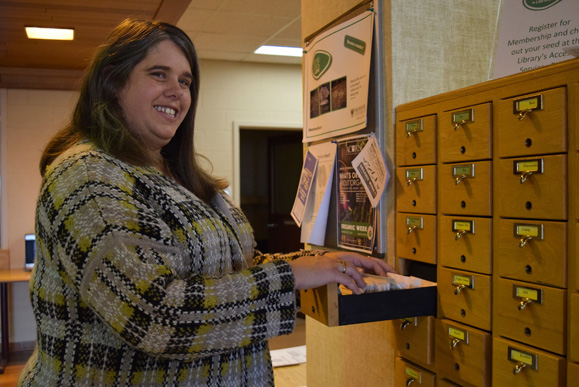Jolene Reid
By Raissa Tetanish
Five thousand seeds – that’s how many were circulated in the first year of the Dalhousie Agricultural Campus’ seed lending library.
“Our first year was fantastic,” said Jolene Reid, co-ordinator of the seed lending library, which opened in March 2014 within the MacRae Library. “We registered over 70 patrons and circulated over 5,000 seeds into the community. To us at the seed lending library, those numbers signify a great success.”

Jolene Reid, co-ordinator of Dalhousie Agricultural Campus’ seed lending library, looks through the current inventory in preparation for the new season. The first year saw more than 5,000 seeds circulated within the community, with donations coming in through the mail from throughout the country.
Seed lending libraries are based on the premise of providing access to a collection of non-hybrid, non-genetically modified seeds. Members “borrow” the seeds to grow, enjoying their harvest and letting a few plants return to seed. Those new seeds are brought into the library for the next season.
“When it comes to seed lending libraries, one of the most frightening things when you start is the returns. The number isn’t going to be that great that first year, but we had a few hearty gardeners who were able to return lots of seeds to us,” Reid said, adding membership currently sits around 100 and roughly 20 per cent of those are active seed savers.
“And those that are seed savers for us are bringing in some beautiful seeds.”
Reid said the lending library has been receiving donations recently, including some mailings from British Columbia.
“We’re getting some rare varieties in,” she said.
Throughout the past year-and-a-half, the lending library has worked with the Living Earth Council in Truro, spreading knowledge about the program through the council’s Seedy Saturday event. The lending library hosted a number of workshops and training events, which were almost filled to capacity.
The most common seed borrowed from the library was tomatoes.
“People love beautiful, red tomatoes, and odd tomatoes,” the co-ordinator said. “The most successful for our seed savers were peas, absolutely, and even beans, which is great.”
The first year was a learning curve, says Reid, and one of the biggest challenges was to convince people the lending library would fit well with the library services on campus.
“We’ve got some great policies in place with some great institutions,” she said, adding they’re able to share resources.
The seed lending library is a member of Libraries Nova Scotia, which means anyone with a library card in the province can request any of the books in the seed lending library, of which there around close to 60.
Reid said the paperwork was also a challenge, because those “returning” their seeds aren’t returning the original borrowed piece. A Science Without Borders student was able to create a program that keeps their inventory together, which can also be shared with others across the country.
“Because we established ours so quickly, a lot of other seed libraries are coming to us for our best practices,” said Reid. “We are trying to keep ours as a shareable model, and that’s an ever-evolving challenge and victory all at the same time.”
She said those with the lending library are gearing up for the next season, and the first thing on their agenda is Seedy Saturday again.
“But right now, we’re going through our inventory, evaluating what was circulated and what was returned most heavily.”
Every year, the library will make an investment in seeds from local producers for their members, and Reid is currently looking into producers of ghost hot peppers, which was one seed the library received several requests for.
